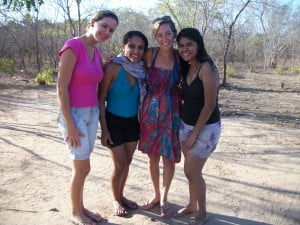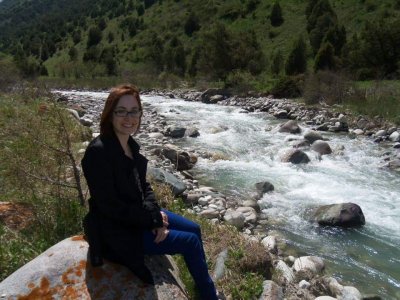
Ilana Robbins Gross, 2012-2013, Fulbright English Teaching Assistant to Brazil (second from right), visiting her students’ hometown in rural Piauí, Brazil – one of the many examples she experienced of people opening up their homes to her
Teresina, a small capital in the almost forgotten state of Piauí in Brazil, is known with affection, pride, and frustration as “the Inferno,” both for its intense heat and historic lack of opportunities.
Despite the roughly one million people who live in the greater metropolitan area, Teresina feels like a small town: everyone knows everyone or at least they know your people. A native New Yorker, I landed in Piauí as a Fulbright English Language Teaching Assistant (ETA), felt the heat (joy!), saw the mainly empty streets (panic), watched as people slowly ducked from shady sliver to shady sliver (behavior I was soon to adopt) and asked myself what the inferno was I going to do for the next nine months?
Once I had gotten over the initial shock, (mostly) adjusted to the heat, and accepted that people would stare at me no matter what I did since for many I was the first foreigner they had ever seen, I set about the business of becoming part of the community and falling in love with a city largely forgotten even by other Brazilians.
As an ETA at the local federal university, I worked with students studying to become English teachers. I helped teachers in their classes, organized conversation hours, and taught a weekly culture class, in which we explored regionalism in the United States, ate “Brazilianized” versions of traditional American food, discussed holidays, taught dances like “the Cuban Shuffle,” and celebrated holidays like Halloween.
People from Piauí are known for being (overly) warm and affectionate, and my students certainly matched the stereotype. Living so far from my family in a place where most locals build a house right next to their parents, people were overcome with pity for me and generously welcomed me into their homes. I spent hours of my weekends with their families, eating barbecue cut into small pieces so everyone could share it, shuffling chairs to stay in the shade, and dancing forró (a country-like music that is played everywhere in Teresina, including heavy metal bars).
And, as cliché as it sounds, it was there, dancing to a type of music I originally hated (and now regularly listen to), among families who insisted on feeding me – a recovering vegetarian – a ridiculous amount of meat, that I fell in love with Teresina, a place I never would have even dreamed of visiting if not for Fulbright. Over a year after leaving, I regularly speak with many of my former students (three of whom are currently studying in the United States and England through the Brazil Scientific Mobility Program) and dream of returning to the Inferno.



1 Comment
Nothing is so important in life than visiting different peoples,and learn about their culture,civilisation. I really appreciat your story.